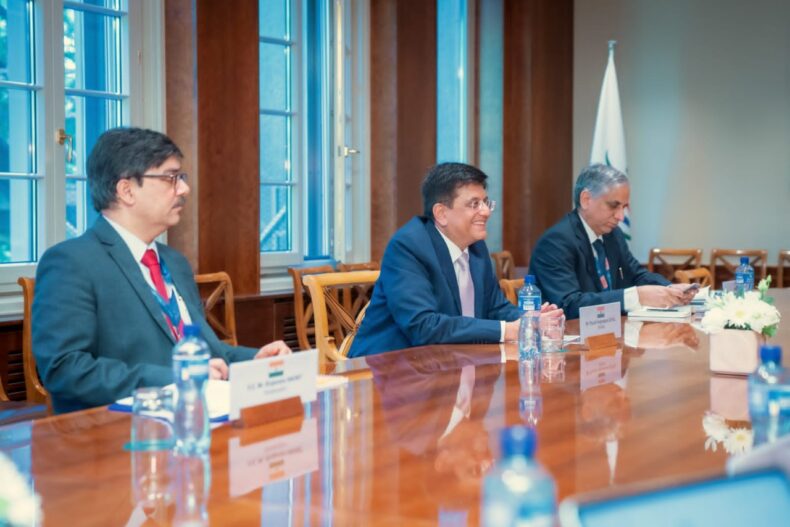NEW DELHI: After addressing the Ministerial Meeting of G33, a coalition of developing nations of which India is a prominent member, in Geneva, the Union Minister of Commerce and Industry, Piyush Goyal, stated on Sunday that India would not yield to pressure and is prepared to meet any challenge.
Goyal delivered these remarks at a press briefing following the G33 Ministerial meeting, during which the Indian delegation he headed explained India’s position on a number of shared-interest themes while keeping in mind the fundamental principles of sustainable development goals (SDGs).
No one can exert pressure on Aatmanirbhar Bharat now. “We can overcome any difficulty. We never make judgments under pressure “During a press conference, he emphasised.
“We articulated our stance with the fundamental principles of sustainable development goals in mind. We raised the issue of developing and impoverished nations.”
The Minister emphasised that India adheres to the principle of “Vasudhaiva Kutumbakam” (the world is one family).
To restore the WTO’s credibility and integrity, he said, member states must address necessary issues, such as the permanent solution to public stockholding, which was agreed upon almost a decade ago.
“The present global food crisis requires an immediate response! Can we put the lives of millions of people who rely on food stockpiles for the poor and vulnerable at risk?” Goyal asked in Geneva.
According to him, the COVID-19 pandemic has revealed the world’s failure to respond immediately to any catastrophe, whether it is food security or health, economic prosperity or open supply networks.
“In order to reestablish confidence and credibility, we must first address necessary matters, such as the lasting solution to public stockholding,” he concluded.
Goyal met with the Director-General of the WTO, Ngozi Okonjo-Iweala, on Sunday in Geneva, Switzerland, on the margins of the 12th WTO ministerial conference, to examine the prospects for a sustainable solution to the public stockholding for food security.
Minister Piyush Goyal conducted detailed discussions with his counterparts from developing and least developed nations at the G33 Ministerial Meeting, a coalition of developing countries of which India is a significant participant.
Goyal said the following on Twitter: “Fighting for the rights of our farmers within an hour of arrival at the G33 Ministerial Meeting at the WTO in Geneva.
With DG Ngozi Okonjo-Iweala and my counterparts from developing and least-developed states, I discussed prospects for a durable solution to public stockholding for food security.”
In addition, Minister of Commerce and Industry Piyush Goyal will meet with United States Trade Representative Katherine Tai.
The ministerial conference resumed on Sunday in Geneva, Switzerland, following a five-year hiatus.
The Indian delegation is led by Piyush Goyal, the Minister of Commerce and Industry. The Ministry of Commerce and Industry stated in a previous statement, “India has a fundamental interest in defending the interests of all stakeholders in the country, as well as the interests of developing and impoverished nations that look up to India’s leadership in multilateral forums like the WTO.”
Key subjects of debate and negotiation during this year’s conference include the WTO’s reaction to the pandemic, discussions about fisheries subsidies, agriculture concerns including Public Stockholding for food security, WTO changes, and a ban on customs taxes on electronic transmission.
In May 2022, the Director-General of the WTO introduced for discussion three draught texts on agriculture, trade and food security, and exemption of the World Food Programme from export limitations.
The Ministry of Commerce and Industry noted, “India has issues about several sections in the draught judgments and has been engaged in discussions and negotiations to safeguard the rights under the agreement on agriculture without weakening the existing ministerial responsibilities.”
The preservation of India’s food grain purchase programme at Minimum Support Prices is an important topic under debate at the World Trade Organization (MSP).
Such programmes, which include the purchase of goods from farmers at regulated pricing, are crucial to the nation’s farmers and consumers.
WTO rules restrict the number of subsidies that may be offered for such items.
This issue is being debated at the WTO by the G-33 and the African Group, which has joined forces with the African, Caribbean, and Pacific (ACP) nations to make a proposal on a permanent solution to the problem of public stockholding for food security reasons by May 31, 2022.
On 15 September 2021, India co-sponsored a G-33 proposal for a permanent settlement on PSH for food security objectives at the WTO, which received 38 co-sponsors.
In the negotiations, developing countries are seeking improvements over the ministerial decision adopted at the WTO’s ninth ministerial conference in Bali in December 2013, in which members agreed to negotiate a permanent solution on the issue of public stockholding for food security purposes by the WTO’s eleventh ministerial conference.
In the interim, until a permanent solution is reached, it was agreed that members would exercise due restraint (commonly referred to as a “peace clause”) in raising disputes regarding public stockholding programmes for food security purposes implemented prior to December 7, 2013, even if countries exceeded their permissible limits.
Due to India’s robust stance at the WTO, the WTO General Council (GC) decided in November 2014 to prolong this peace provision until a permanent solution was agreed upon and implemented.
Thus, it was ensured that the ‘peace clause’ would always be accessible. At the December 2015 Nairobi Ministerial Conference, WTO members committed to exploring a lasting solution in a constructive manner.
The ministry stated that India does not wish to link the public stockholding (PSH) problem with other agriculture concerns or a work programme, as finding a lasting solution is a separate WTO mission.













